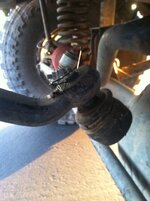Dos Perros
WKR
I know for a fact I can shift talk on a cell phone and eat a chicken sandwich at the same time.
Follow along with the video below to see how to install our site as a web app on your home screen.
Note: This feature may not be available in some browsers.
On my first trip out west, we rattled free two spark plugs wires. We were headed up the mountain and noticed we loosing power and oil pressure and the check engine light started flashing. We found one loose wire and the truck fired up and finished the drive up the mountain. Re checked at the top and found the 2nd plug wire that was loose. Truck ran great for the rest of the trip.We’ve come to realize that the rough roads can rattle a lot more loose that you don’t think of, not just flattening a tire.
I was hunting this Fall in Colorado with my daughters (10 & 13). We were at 10 miles from a paved road. And these were 10 deep rutted, scratch your truck miles. From the paved road, we were another 45 minutes to even a small small town. When we got in my Ford F-250, I pressed the start button and nothing happened. I was mildly panicking while I waited 30 seconds and tried it again. It started up and we were able to drive out. It hasn’t done that since. But it got me thinking. What would I have done if my truck was truly broken down back there. I can fix a flat and bring power banks to jump a dead battery. But that’s about it. Have any of you broken down out in the woods? Are there mechanics that go out in the backcountry? How does that work?


Just plug in a lil 5W solar panel trickle charger into your cigarette lighter socket and leave the panel on the dash so it can keep topping off the battery while you're out and about. Chances are likely though if your battery died while up there it was because of the cold and that the battery was on its last legs anyway... OR... that your charging system hasn't been sufficiently pumping enough charge back into it while the engine is running.That's my biggest fear - a dead battery. Not much will work without it, and it's so easy to do especially in really cold temps for days. I have replaced my battery every 2 years, right before my elk hunt, for this reason. Might be overkill, but that's cheap insurance.
got any room left for your hunting gear?Lots of good lists here, I go cross country in 20 year old stuff on a regular basis. I've got a tote that comes with every time with every fluid that my rig uses, Motor oil, ATF, Gear lube, coolant, autotrac transfer case fluid, brake fluid etc. and a set of funnels, gear lube pump, or whatever it takes to get the fluid where it needs to go. I'm usually watching for any indication of fluids leaking. I take a well rounded set of tools including a half inch drive set of impact sockets, standard and metric, and a good breaker bar. I run new load range E tires on everything. If I'm towing I started bringing a little laser thermometer gun with and I keep an eye on bearings and tire temps when I'm filling up with gas. Before a long trip I jack up the front end and check for any bearing play (Caught a wheel bearing on my current rig that wasn't making any noise but had some play in it) I've got my used fan belt and an idler pulley, and I check my idler and tensioner pulleys once a year, if they free spin forever its time to change them out. Use good replacement parts, not cheapo internet stuff. Keep a set of mini and regular fuses on hand, a test light, ohm meter, and code reader. I also keep 5 gallons of gas with on long trips. I can pretty much fill a flush mount pickup tool box, but its very rare that something goes down that I can't remedy. On our last MT trip this year I had a brake line rust out, fortunately it was a Saturday, I used a vice grip to clamp the line, topped the reservoir off and took it easy getting to Glendive, bought a tubing cutter, piece of brake line, and 2 compression fittings at Napa and after half an hour or screwing around in the parking lot we were on out way again. Being able to fix stuff saves you time in a lot of cases not having to wait till Monday for the Mechanic.
Lol, it all fits in a flush mount tool box.got any room left for your hunting gear?
